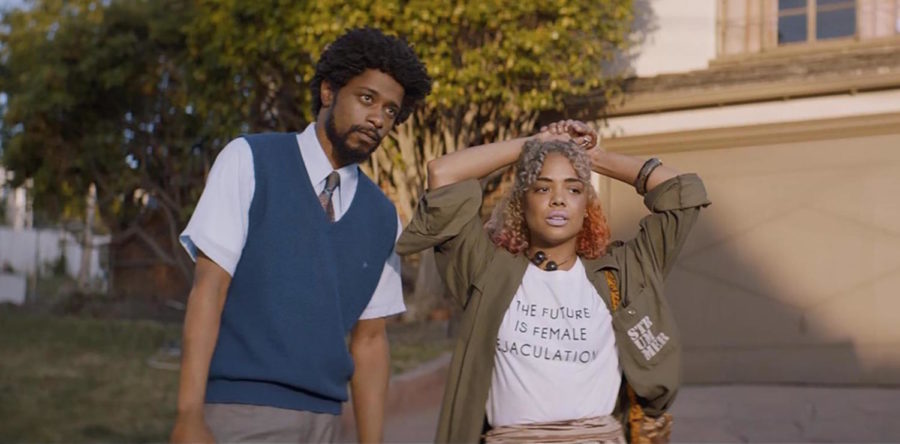Sorry to Bother You, the first film by writer and director Boots Riley, opens with a shot in which its main character Cassius Green applies for a job. In the background is a safety sign, cut off by the camera so that in this moment it only reads “You.” The camera then flips to focus on the hiring manager, near another safety sign, also cut off so that it only reads “Manager.”
This basic opposition, between worker and higher-up, is at the heart of the film, which Doc Films showed in an advanced screening last Tuesday. Riley’s artistic concern with inequality is likely related to the fact that he was a community organizer before he became a director. Unlike so many entertaining but unambitious movies about the modern workplace, his filmmaking comes from a position of ethical commitment. Sorry to Bother You is both funnier and more serious than other films like it.
Riley’s commitment to the film, however, does not only stem from his background in community work. His film explores the entire American world that revolves around work and the workplace—the ways in which our family, friendships, relationships, and we ourselves are transformed by our seemingly inescapable engagement with (drumroll, please) capitalism.
This is the starting point for Sorry to Bother You: Cassius is out of money, living in his uncle’s garage, and looking for a job. He finds one at RegalView, a telemarketing company that holds the possibility of becoming a wealthy “power caller” over its employees’ heads.
Cassius easily becomes a power caller with the help of his “white voice,” a high-pitched voice that’s “not really what white people sound like, it’s what they think they sound like. Or what they want to sound like.” The voice weirds out his friends, wins over his employers, and takes the audience through a whole spectrum of feeling. As a power caller, he makes enormous amounts of money in exchange for selling his soul, and sometimes human lives. The role his “white voice” plays in the film, signaling an intersection of race, capitalism, and sense of self, is highly complicated and characteristic of Riley’s heavily symbolic, satirical style.
Indeed, Sorry to Bother You’s plot is loaded with symbolism, and to ignore it is akin to not watching the movie. Much of the fun in the film’s first half involves decoding Riley’s obvious and subtle symbols and relating them to the film’s broader subject. Cassius’s artist fiancée, for example, is named Detroit because her parents “wanted her to have a name that sounded American.” She makes multimedia sculptures of Africa (“they’re big because Africa’s big”) and wears earrings the size of Coke cans that spell out short phrases in block text. Sometimes they’re easy to read, like the first pair we see her wearing: “Murder Murder/ Kill Kill,” but as the film goes on we find ourselves squinting to make out a Bob Dylan lyric: “bury the rag/ deep in your face.”
The most obscure but omnipresent symbol in Sorry to Bother You, one that reveals the depth of Riley’s engagement in the history of American capitalist and racial symbolism, is Cassius’s head wound. He receives it while pushing through a line of workers on strike, literally crossing a moral line. Someone throws a can that hits Cassius on the forehead, and news cameras broadcast the moment to millions of viewers. The head wound Cassius receives, recognizable by everyone he meets, only gets bloodier as the film goes on. The reference, in this case, is to the “mark of Cain” received by Cain in the Bible for killing his brother. But the allusion to Cain is more than simply biblical, it recalls a claim once used to justify slavery in America—that black people were descendants of Cain, that their blackness was the mark of sin, and that inhumanly profiting off their labor was justified. Riley thus uses Cassius’s mark in two senses here: To the extent that he is morally compromised, it signals to everyone that he has done wrong. And to the extent that his blackness is being heartlessly taken advantage of, it evokes the history of such exploitation.
Though it is tempting to talk entirely about the directorial artistry of the film, which is breathtaking for its strangeness, high production quality, and enormous self-confidence, the actors are also uniformly incredible. Lakeith Stanfield’s performance as Cassius is a tour de force of a morally compromised, often thoughtless, I-didn’t-ask-for-this 30-something. Tessa Thompson’s mysterious, ethical, and ominous Detroit provides both a fascinating character and someone to root for. Supporting performances, too, are excellent: Danny Glover plays a by-turns hilarious and knowing older telemarketer, Steven Yeun an awkward but occasionally heroic union leader, and Armie Hammer a terrifying and conscienceless corporate evil-doer. There are many, many more.
While Sorry to Bother You might take more turns and introduce more characters than it can keep track of, the confusion seems intentional. After all, the whale this film is chasing is not the same classically satisfying, artistic whole that other films are after. Much that might have been developed is left open, and much that is suggestive is left to remain so. Sorry to Bother You pursues a multi-pronged, deeply sad, artistically groundbreaking, and hilarious satire of capitalist America. To pay too much attention to the minutiae of the film would be to sacrifice that goal. Instead, Boots Riley makes this movie sad, serious, funny, and frightening. The only constant is his focus on the ethical horror of American capitalism. It’s a wild ride, and highly recommended.










